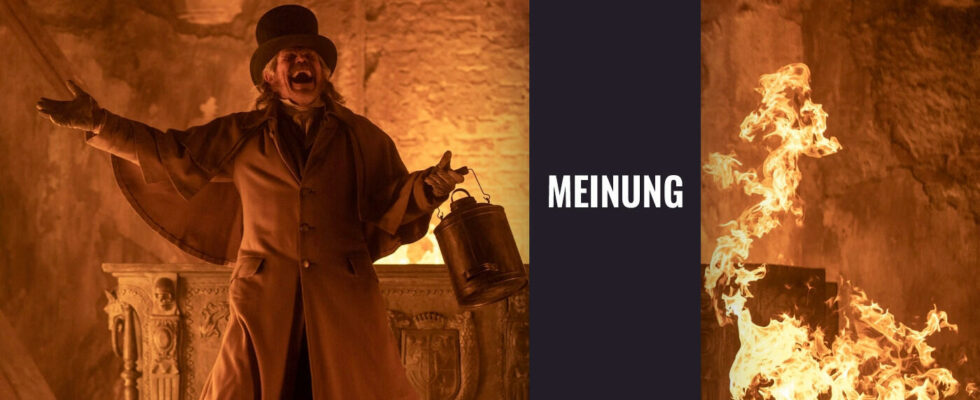It’s not often that a director emerges who makes such a compelling impression with his first two films that future film release dates are more or less declared cinema holidays. But that was the case with Robert Eggers and his off-the-cuff masterpieces The Witch and The Lighthouse. With Nosferatu – The undead goes on January 2, 2025 launched his most ambitious project to date: a remake of the German horror classic by FW Murnau.
It is certain that no film fan will be dissuaded from experiencing this film, which has been planned for a decade, in the cinema. But is Nosferatu as brilliant as Eggers’ two first novels, or a more mixed bag like his Viking saga The Northman?
Nosferatu by Robert Eggers: A horror symphony of creeping frustration
As Eggers revealed in an interview with Variety and during the Nosferatu world premiere in Berlin, he maintains an intimate relationship with the original German film. As is well known, Murnau’s 103-year-old version was one unlicensed adaptation of Bram Stoker’s vampire novel Draculawhich could be accused (for legal reasons alone) of sticking too closely to the original story. The situation is very similar with Eggers, who is so attached to the original film, like a bride made to please the bloodsucker baron.
Anyone who knows the story will find little new in this paragraph: In 1838, the newly married Thomas Hutter (Nicholas Hoult) is sent from Germany to Transylvania to handle Count Orlok’s (Bill Skarsgård) real estate business. The locals fear him and Thomas soon realizes that there are scary things going on in the old aristocrat’s castle. When Orlok targets his mentally unstable wife Ellen (Lily-Rose Depp) in Germany, who seems to have had a mysterious connection to the vampire count for a long time, the occult expert Prof. Eberhart is consulted by Franz (Willem Dafoe).
Eggers took the greatest liberties with his interpretation of Count Orlok. Not a creeping, wizened aristocrat with long fingers, but a huge monster of a man with a mustache and a brutal growling voice, for which Skarsgård received special instructions from an opera singer. The subtext of sexual violence is stripped of any ambivalence here, but it works. What’s less clicky is the associated, developed relationship with Ellen, whose psychological episodes seem annoyingly repetitive and aren’t always convincing in terms of acting.
Even more unnecessary are many scenes with the Hardings’ friends (Emma Corrin and Aaron Taylor-Johnson) as well as unnecessary expositional litanies regarding vampire mythology. Over 100 years after Nosferatu, we all know roughly how things work with bloodsuckers and sunlight. It’s not entirely clear why a film that is so beautifully and technically complexly constructed has to be complicated with such boring constant dialogue.
Nosfera Two: If the vampire remake seems a bit bloodless
Skarsgård is really all sorts of things as an unprecedented interpretation of the pseudo-Dracula Orlok and, like with the IT horror clown Pennywise, makes the role his own. The finale in particular turns into an excessive blood orgy that you won’t quickly forget. The last scene and shot brings back vivid memories of both paintings on the subject of the Black Death and another German horror classic: Nekromantik. Terribly beautiful and beautifully terrible.
I just wish we could speak with similar ecstasy about the rest of the cast and the rest of the vampire machinations in the film. Unfortunately, Depp and Hoult’s acting contributions can only be described as “serviceable”, but the biggest disappointment may be Willem Dafoe of all people. Especially if you’ve just seen him as a likeable, crazy scientist in Poor Things, his odd Van Helsing blend leaves a bit of eccentricity to be desired in comparison.
Watch the original trailer for Nosferatu here:
Nosferatu – Trailer (English) HD
For fans of Eggers’ early work (The Witch and the Lighthouse), Nosferatu is more likely to be located on the mixed Northman side of his films. Maybe the director is more coherent on a smaller scale and should stay away from epics with a lot of moving parts. But especially from remakes in which it is too closely married to the original.
So his Nosferatu tells us anything new, let alone something of its own, about sexual violence or the “blood-sucking” class of the wealthy, which Dracula and the German film original would not have told us over 100 years ago. A missed opportunity, especially in view of the gaping distributional situation.
